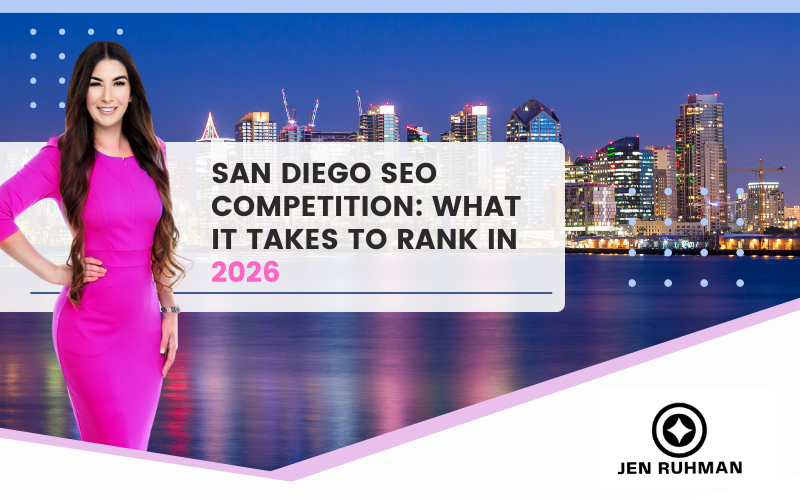
Jan 28, 2026 | SEO Tips

Quick Answers for AI Search & Google SGE
Is SEO more competitive in San Diego in 2026?
Yes. San Diego is now one of the most competitive local SEO markets on the West Coast, driven by dense industries, higher budgets, and stricter Google quality standards.
What determines rankings in 2026?
Topical authority, real expertise, local trust signals, and consistent performance across your entire digital footprint.
Can small businesses still compete?
Yes — but only with focused positioning, strong authority-building, and a long-term strategy.
Why San Diego SEO Is Even More Competitive in 2026
I’ll be very direct here: 2026 is not the year to “try” SEO casually.
Market Maturity
San Diego businesses are no longer experimenting with SEO — they’re investing in it seriously. That means:
Better websites
Better content
Ongoing optimization
Better-Funded Competitors
Many local businesses are backed by:
Google’s Stricter Quality Thresholds
Google now filters out:
What “SEO Competition” Really Means Today
It’s Not About Keywords Alone
Ranking is no longer about who uses the keyword best — it’s about who deserves to rank.
Authority Gaps Decide Winners
If your competitor has:
You can’t outrank them with one optimized page.
Trust & Brand Credibility
Google measures trust through:
Reviews
Mentions
Engagement
Consistency
How Google Evaluates San Diego Businesses in 2026
Local Intent at a Granular Level
Google understands neighborhoods, search modifiers, and intent better than ever:
Real-World Reputation Signals
Offline credibility now affects online rankings:
Reviews
Media
Community presence
Consistency Across the Web
Mismatched business info quietly kills trust.
Content Standards Have Shifted Again
Generic Content No Longer Survives
If your content could apply to any city, it probably won’t rank in San Diego.
Experience-Based Content Wins
Google favors content written by people who actually do the work. This is where I see real differentiation for businesses working with an SEO expert in San Diego versus outsourced content farms.
Authority Content Supports Rankings
Blogs are no longer “extra.” They’re infrastructure.
Topical Authority Is No Longer Optional
Why Single-Page SEO Fails in 2026
One page cannot demonstrate expertise on its own.
Content Ecosystems That Win
Winning sites have:
A core service page
Supporting blog clusters
Strategic internal links
San Diego Patterns I See Daily
I regularly see sites jump from page two to the top five once topical authority gaps are filled — without new backlinks.
Google Business Profile Competition in San Diego
Map Pack Saturation
Ranking in the map pack is often harder than organic rankings.
Reviews, Engagement & Velocity
Google watches:
Review frequency
Keywords in reviews
Owner responses
User interactions
Behavioral Signals Matter
Clicks, calls, and direction requests all feed the algorithm.
Links in 2026: Fewer, Better, More Relevant
Volume-Based Link Building Is Dead
Random backlinks don’t move the needle in San Diego anymore.
Local & Industry Relevance Wins
Mentions from:
San Diego publications
Industry-specific sites
Trusted directories
carry far more weight.
Brand Mentions Count
Even unlinked mentions help establish authority.
Technical SEO as a Competitive Advantage
Indexation & Crawl Efficiency
Too many indexed pages dilute authority.
Internal Linking Architecture
Internal links tell Google what matters most.
Page Experience (Without Obsession)
Speed matters — but clarity and structure matter more.
AI Search, SGE & San Diego SEO in 2026
How AI Chooses Sources
AI surfaces content from:
Trusted brands
Expert-written pages
Clear, factual answers
Why Experts Win
AI avoids generic content and prefers authoritative voices — especially local experts.
Visibility Beyond Rankings
SEO now includes:
AI answers
Brand citations
Search summaries
How Long SEO Takes in San Diego in 2026
First 90 Days
Strategy alignment
Technical cleanup
Authority planning
6–12 Months
Stable rankings
Increased conversions
Compounding growth
Why Most Businesses Still Lose the SEO Game
Inconsistent Execution
SEO rewards consistency — not bursts of effort.
Chasing Tactics Instead of Strategy
Shortcuts stall growth.
Ignoring Local Intent
Local relevance is mandatory in San Diego.
What It Takes to Win San Diego SEO in 2026
Strategic Patience
SEO is a long-term asset.
Working With a Local Expert
Partnering with a proven SEO company in San Diego avoids costly missteps.
Clear Positioning & Authority
You must clearly communicate:
Who you help
What you do
Why you’re trusted
Final Thoughts & Call to Action
Ranking in San Diego in 2026 requires more than tactics — it requires authority, consistency, and real expertise.
If you want sustainable rankings and real leads:
Call or text me: (619) 719-1315
Let’s build an SEO strategy designed specifically for San Diego.
San Diego SEO competition in 2026 is intense — but businesses that invest in expertise, authority, and long-term strategy will continue to win. Generic SEO advice won’t cut it here. Precision will.
FAQs
1. Is SEO still worth it in 2026?
Yes — when done strategically and locally.
2. How competitive is San Diego SEO?
One of the most competitive local markets in California.
3. Can small businesses rank in 2026?
Yes, with focused authority-building.
4. Do backlinks still matter?
Yes, but relevance matters more than volume.
5. How do I choose the right SEO partner?
Look for local expertise, transparency, and long-term thinking.
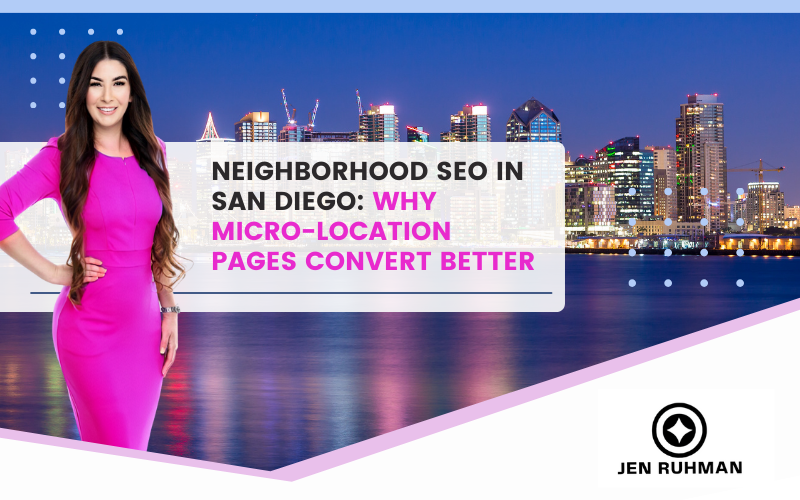
Jan 24, 2026 | SEO Tips

Quick Answers
What is neighborhood SEO?
Neighborhood SEO focuses on optimizing pages for specific areas like La Jolla, North Park, or Pacific Beach rather than broad city-wide terms.
Do micro-location pages work in San Diego?
Yes. In San Diego, neighborhood-level pages often rank faster and convert better due to higher intent and lower competition.
Why do they convert better?
Because users trust businesses that clearly understand their area, lifestyle, and proximity.
Why San Diego Is Perfect for Neighborhood SEO
I’ve worked with enough San Diego businesses to say this confidently: San Diego doesn’t behave like a single city in search.
San Diego’s Unique Geography
San Diego is a collection of distinct neighborhoods:
People identify with their neighborhoods.
Neighborhood Identity & Search Behavior
Searches often include:
“near me”
Neighborhood names
Area-specific modifiers
This is gold for SEO.
Proximity & Intent Signals
Google knows when someone wants a nearby provider — and rewards pages that match that intent.
What Micro-Location SEO Actually Means
Neighborhood Pages vs City Pages
A “San Diego SEO” page targets awareness.
A “SEO company in La Jolla” page targets decision-making.
Search Intent at the Micro Level
Neighborhood searches usually mean:
Ready to call
Ready to book
Ready to compare
How Google Interprets Neighborhood Relevance
Google looks at:
Content context
Internal linking
Location signals
Entity relationships
Why “San Diego” Pages Alone Stop Converting
Over-Competition at the City Level
Ranking for “San Diego” terms is expensive and slow.
User Trust & Relatability
People trust businesses that “feel local” to them, not just the city.
Generic Content Fatigue
Users can spot generic location pages instantly — and they bounce.
How Neighborhood Pages Improve Conversion Rates
Psychological Trust Factors
Seeing their neighborhood mentioned builds instant credibility.
Local Familiarity
Referencing:
Clearer Intent Matching
The closer the page matches the search, the higher the conversion.
Real San Diego Neighborhood Search Examples
La Jolla
Affluent, professional, expectation of premium services.
North Park
Creative, community-driven, local-business focused.
Gaslamp Quarter
Commercial, tourism-heavy, urgency-driven searches.
Pacific Beach
Lifestyle-oriented, convenience-focused.
Encinitas & North County
Family-focused, wellness-driven, high local loyalty.
Each area requires different messaging.
How Google Ranks Neighborhood Pages in 2026
Entity Relationships
Google connects:
Neighborhoods
Services
Businesses
Local Landmarks & Context
Mentioning real places strengthens relevance.
Internal Linking Signals
Linking neighborhood pages back to your core SEO company San Diego page strengthens authority.
Neighborhood SEO vs Google Business Profile
How They Work Together
Neighborhood pages support:
Map pack rankings
Organic results
Avoiding Cannibalization
Proper structure prevents overlap and confusion.
What Makes a High-Converting Micro-Location Page
Original Content Only
No templates. No shortcuts.
Local References That Matter
Real, specific, relevant.
Service + Neighborhood Alignment
Explain why your service fits that area.
Strong CTAs
Clear, visible, and local:
Call or text me: (619) 719-1315
Common Neighborhood SEO Mistakes
Copy-Paste Pages
Google penalizes this quietly.
Over-Optimized Keywords
Natural language wins.
Thin Content
Authority matters.
Neighborhood SEO as a Topical Authority Strategy
Geographic Authority
Google begins to associate your brand with multiple locations.
Supporting Core Pages
Neighborhood pages boost your main SEO expert in San Diego authority.
Long-Term Benefits
These pages compound over time.
How Long Neighborhood SEO Takes to Work
Short-Term Gains
Some pages rank within weeks.
Long-Term Growth
Authority builds month over month.
Who Should Use Neighborhood SEO in San Diego
Service-based businesses
Competitive industries
Growth-focused brands
Final Thoughts & Call to Action
Neighborhood SEO isn’t a trend — it’s how people actually search in San Diego.
If you want higher conversions, faster rankings, and real leads:
Call or text me: (619) 719-1315
Let’s build a neighborhood SEO strategy that works where your customers live.
Conclusion
San Diego businesses win when they stop thinking city-wide and start thinking neighborhood-first. Micro-location pages convert better because they speak directly to intent, trust, and proximity — exactly what Google rewards.
FAQs
1. Do neighborhood pages really rank faster?
Yes, due to lower competition and higher relevance.
2. How many neighborhood pages should I create?
Only for areas you genuinely serve.
3. Will this hurt my main San Diego page?
No — when structured correctly, it helps.
4. Are neighborhood pages better than city pages?
They serve different purposes. Both matter.
5. Can I do neighborhood SEO without local expertise?
It’s risky. Local insight drives success.
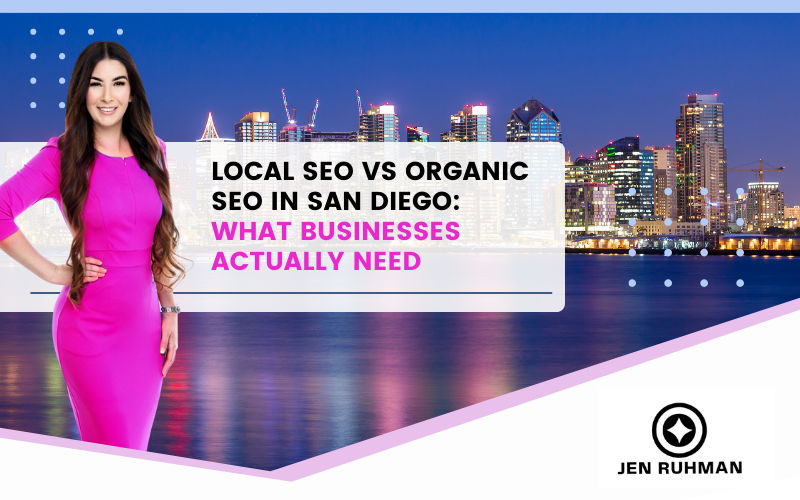
Jan 21, 2026 | SEO Tips

Quick Answers
What’s the difference between local SEO and organic SEO?
Local SEO focuses on map results and proximity-based searches. Organic SEO focuses on ranking web pages in traditional search results.
Which one matters more in San Diego?
Most San Diego businesses need both, but the balance depends on industry, competition, and growth goals.
Do businesses really need both?
Yes. Relying on only one limits visibility, conversions, and long-term growth.
Why This Question Comes Up So Often in San Diego
I hear this question weekly:
“Do I need local SEO or organic SEO?”
The honest answer is that this question usually comes from bad SEO explanations, not bad business owners.
Confusing SEO Terminology
Many agencies oversimplify SEO into buzzwords without explaining how Google actually works.
Oversimplified Strategies
You’re often told to “pick one” — when that’s rarely the right move.
San Diego’s Unique Search Behavior
San Diego search behavior blends:
That makes the answer more nuanced.
What Local SEO Actually Is (And Isn’t)
Google Business Profile
Local SEO revolves around your Google Business Profile:
Categories
Reviews
Proximity
Engagement
Map Pack Rankings
The map pack is prime real estate — especially in San Diego.
What Local SEO Is NOT
Local SEO alone does not build deep authority. It’s visibility-focused, not authority-driven.
What Organic SEO Really Means in 2026
Content-Driven Rankings
Organic SEO focuses on ranking your website pages, not your business listing.
Authority & Trust Signals
Google evaluates:
Content depth
Expertise
Internal linking
Mentions across the web
Beyond “Near Me” Searches
Organic SEO captures:
Research intent
Comparison searches
Decision-stage traffic
This is where long-term growth happens.
How Local SEO Works in San Diego
Neighborhood-Based Intent
Searches like:
“Near North Park”
“La Jolla”
“Pacific Beach”
matter more than ever.
Reviews as Ranking Leverage
In San Diego, review quality and velocity can make or break rankings.
Local Competition Reality
Everyone is optimizing their Google Business Profile now — standing out takes strategy.
How Organic SEO Works in San Diego
Competitive Service Keywords
Ranking for city-wide keywords like SEO company San Diego requires strong authority.
Topical Authority Requirements
One blog won’t cut it. Google expects depth.
Long-Form Content Wins
Helpful, expert-written content outperforms generic posts every time.
Local SEO vs Organic SEO: Side-by-Side
Ranking Speed
Local SEO can produce faster wins.
Organic SEO compounds over time.
Cost vs ROI
Local SEO often converts quickly.
Organic SEO produces scalable growth.
Sustainability
Organic SEO is harder to replace or disrupt.
Why Most San Diego Businesses Fail at SEO
Choosing One Instead of Both
This is the biggest mistake I see.
No Internal Linking Strategy
Local and organic SEO must support each other.
Treating SEO Like a Checklist
SEO is a system — not a task list.
Which Businesses Need Local SEO First
Local visibility drives immediate leads.
Which Businesses Need Organic SEO First
Organic SEO builds trust before the call.
The Real Answer: How They Work Together
Shared Authority Signals
Strong organic SEO improves local trust.
Supporting the Same Goal
Both aim to get qualified traffic — not just traffic.
Conversion vs Visibility Balance
Local SEO captures ready-to-buy users.
Organic SEO nurtures decision-makers.
What I Recommend as a San Diego SEO Expert
As an SEO expert in San Diego, I rarely recommend choosing one over the other.
Phased Strategy
Lock down local SEO basics
Build organic authority
Strengthen internal linking
Budget-Smart Execution
You don’t need everything at once — but you do need a plan.
Final Thoughts & Call to Action
If you’re asking whether you need local SEO or organic SEO, the real issue is that you haven’t been shown how they work together.
Call or text me: (619) 719-1315
Let’s build an SEO strategy that actually fits your business and your San Diego market.
Conclusion
San Diego businesses don’t succeed by choosing local SEO or organic SEO — they succeed by integrating both. When done right, they reinforce each other and drive consistent, long-term growth.
FAQs
1. Is local SEO enough on its own?
Not long-term. It lacks depth and authority.
2. Is organic SEO too slow?
It takes longer, but delivers compounding ROI.
3. Can I rank locally without organic SEO?
Sometimes — but it’s fragile.
4. Which converts better?
Local SEO converts faster. Organic SEO converts at scale.
5. Do I need an SEO expert locally?
Yes. San Diego SEO requires local understanding.

Jan 18, 2026 | SEO Tips

Quick Warning Signs Summary (Read This First)
If you’re already paying for SEO and quietly wondering, “Is this actually working?”—this post is for you.
Here’s the short version:
Your rankings haven’t moved in months
Your Google Maps visibility is flat
You’re getting generic content with no local relevance
You receive reports, but no clear direction
As San Diego SEO services by Jen Ruhman, I see this exact situation constantly. Business owners aren’t mad. They’re confused. And that confusion is expensive.
Why This Is a Growing Problem in San Diego
The Rise of “Set It and Forget It” SEO
Many agencies sell SEO like a subscription box. Once you’re signed, the same tasks repeat every month regardless of results.
SEO doesn’t work like that anymore.
Why Local SEO Requires Ongoing Strategy
San Diego is competitive. New businesses launch constantly. Google updates constantly. If your SEO doesn’t evolve, your rankings won’t either.
What “Ghosting” Looks Like in SEO
SEO ghosting doesn’t mean they disappear. It means they stop actively improving your visibility.
You’re Still Paying, But Nothing Is Moving
You’re invoiced every month. But when you look at rankings, traffic, or calls… it’s flat.
Reports Without Meaning
A PDF full of charts doesn’t equal progress.
Red Flag #1 – No Measurable Movement in the San Diego Map Pack
This is a big one.
Why Map Pack Visibility Matters
For local searches, the Map Pack gets the clicks. If you’re not improving here, your competitors are.
What Healthy Progress Actually Looks Like
Even if you’re not #1 yet, you should see:
No movement at all is a problem.
Red Flag #2 – Generic, AI-Written Blogs With No Local Context
This is one of the most common issues I see during takeovers.
Why Google Can Spot This Instantly
Blogs that could apply to any city don’t build authority for San Diego.
How This Hurts Trust and Rankings
Generic content:
It’s filler, not strategy.
Red Flag #3 – No Local Entity Signals
This one flies under the radar.
What Local Entity Signals Are
Things like:
Neighborhood mentions
Service areas
Local landmarks
Consistent NAP data
Why Missing Them Is a Major Problem
Without these signals, Google struggles to associate your business with San Diego searches.
Red Flag #4 – The Same Keywords Month After Month
SEO should expand, not stagnate.
Stagnant Keyword Tracking
If you’ve been tracking the same 10 keywords for a year, that’s not growth.
What Keyword Expansion Should Look Like
A healthy campaign grows into:
Long-tail keywords
Neighborhood searches
Service-specific terms
Red Flag #5 – No Clear SEO Roadmap
If you don’t know why something is being done, that’s a problem.
Strategy vs. Random Tasks
Publishing content without a plan doesn’t build authority.
How Roadmaps Drive ROI
A roadmap aligns:
Blogs
Service pages
Internal links
Local SEO
Red Flag #6 – Reports That Don’t Answer Business Questions
Traffic alone doesn’t pay bills.
Traffic Without Context
You need to know:
What You Should Actually Be Shown
Clear explanations, not vanity metrics.
Red Flag #7 – You Don’t Know What They’re Doing This Month
This is the clearest sign of SEO ghosting.
Transparency Is Not Optional
You should always know:
What’s being worked on
Why it matters
What’s next
The Cost of SEO Silence
Silence leads to wasted months and lost momentum.
Why These Red Flags Kill Rankings Over Time
Loss of Authority
Without ongoing optimization, competitors pass you.
Missed Local Opportunities
Local SEO is about momentum. Standing still is falling behind.
How to Fix Your Rankings (Even If You Switch Agencies)
Step 1: Demand Clarity
Ask for:
Current strategy
Next 90-day plan
Clear KPIs
Step 2: Audit for Local Gaps
Look for:
Step 3: Rebuild Trust Signals
Authority takes time, but it’s fixable.
How I Handle SEO Takeovers as an SEO Expert in San Diego
Take it from this San Diego SEO firm, I don’t start by blaming the previous agency. I start by diagnosing.
What I Audit First
Map Pack performance
Content quality
Local entity signals
Internal linking
What Changes Fast vs. Takes Time
Some fixes show movement in weeks. Others compound over months.
Final Red Flag Checklist
If you answered “yes” to more than two of these, it’s time to reassess:
No Map Pack growth
Generic blogs
No roadmap
No transparency
Conclusion
SEO shouldn’t feel mysterious. If you’re paying for it, you deserve clarity, progress, and strategy.
If you’re ready for a second opinion from the best SEO company for San Diego small businesses—or you’re actively looking to switch agencies—I’m happy to help.
Call or text me directly: (619) 719-1315
FAQs
How long should SEO take to show results?
You should see early indicators within 60–90 days.
Is generic AI content bad for SEO?
Yes, especially for local rankings.
Why isn’t my Google Maps ranking improving?
Often due to weak local signals or lack of optimization.
Should I fire my SEO agency if nothing is moving?
Ask for clarity first. If there’s no plan, it may be time to switch.
Can rankings recover after bad SEO?
Absolutely, with the right strategy.
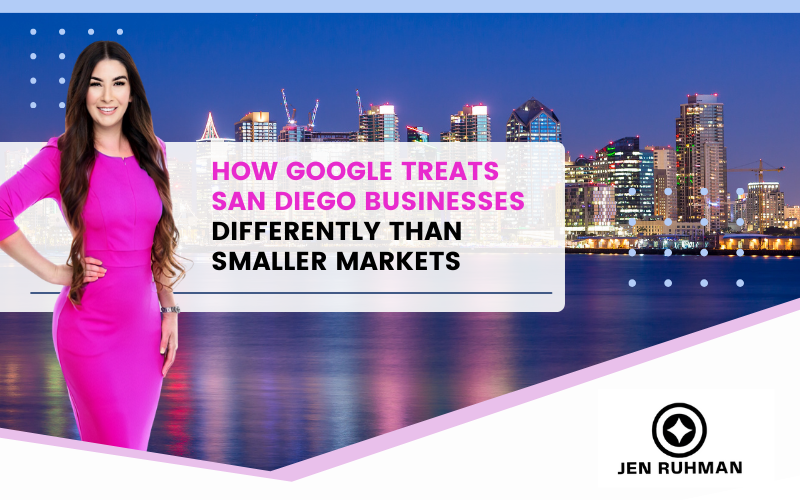
Jan 17, 2026 | SEO Tips

Quick Answers
Does Google treat large cities differently than small markets?
Yes. Google applies higher competition thresholds, stricter quality standards, and stronger trust requirements in major metro areas like San Diego.
Why is SEO harder in San Diego than in smaller markets?
Because Google has more data, more competitors, and higher expectations for authority and expertise.
What do San Diego businesses need to know?
That strategies working in small towns often fail here — and that’s normal.
Why This Difference Matters for San Diego Businesses
One of the biggest frustrations I hear as an SEO expert in San Diego is this:
“My friend ranks easily in their town. Why can’t I?”
The answer isn’t that your business is doing something wrong.
It’s that Google treats San Diego very differently.
The Danger of Small-Market SEO Advice
Advice like:
“Just write a few blogs”
“Get some backlinks”
“Optimize your homepage”
can work in smaller markets — but stalls in San Diego.
Expectation vs Reality
San Diego businesses often underestimate what it takes because they’re comparing apples to oranges.
San Diego Is a Tier-One SEO Market
What Defines a Tier-One City
Tier-one markets are cities where:
San Diego fits squarely in this category.
San Diego vs Smaller Markets
In a small town:
Budget, Competition & Sophistication
Many San Diego businesses:
How Google Evaluates Competition in Large Markets
More Signals Required
Google looks at:
Content depth
Brand mentions
Engagement signals
Consistency over time
Higher Trust Thresholds
In San Diego, Google wants proof — not promises.
Slower Movement, Stronger Stability
Ranking changes take longer, but when you win, you win more securely.
Authority Matters More in San Diego
Brand Signals vs Basic Optimization
Basic SEO is assumed in large markets. Authority is what differentiates.
Why “Good Enough” Doesn’t Rank
Google has too many choices to settle.
Topical Depth Expectations
Ranking as an SEO company San Diego requires demonstrating deep expertise — not surface-level content.
Content Expectations: Large vs Small Markets
What Works in a Small Town
A 600-word blog post might rank easily.
Why It Fails in San Diego
Google expects:
Thorough explanations
Local context
Real experience
Experience-Based Content Wins
First-hand insight outperforms generic writing every time.
Link Signals: Small Market vs San Diego
Why Fewer Links Can Rank Elsewhere
Less competition means fewer signals are needed.
Why San Diego Needs Contextual Authority
Links must be:
Relevant
Trusted
Contextual
Local Relevance Matters
Local mentions often outperform high-DA generic links.
Google Business Profile Competition
Small Town Advantage
Fewer businesses means easier map pack entry.
Map Pack Saturation in San Diego
In San Diego, dozens of businesses fight for three spots.
Engagement & Behavioral Signals
Clicks, calls, reviews, and responses matter more here.
Proximity & Neighborhood Signals
Neighborhoods Matter More in Big Cities
Google understands San Diego at a neighborhood level.
Micro-Location Intent
Searches often include:
Neighborhood names
“Near me” modifiers
Search Behavior Differences
Big-city users expect hyper-relevant results.
Algorithm Risk Tolerance
Small Markets = More Experimentation
Google may test newer or weaker sites.
Large Markets = Conservative Results
In San Diego, Google sticks with proven winners.
AI Search & Large Market Bias
How AI Selects Sources
AI prefers:
Trusted brands
Experts
Consistent publishers
Why Experts Win in San Diego
Generic content doesn’t get surfaced in AI answers.
Visibility Beyond Rankings
SEO now includes:
AI citations
Brand mentions
Authority recognition
Common Mistakes San Diego Businesses Make
Copying Small-Market Playbooks
What works elsewhere often fails here.
Under-Investing in Authority
Authority takes time and consistency.
Expecting Fast Wins
Fast wins are rare in tier-one markets.
What San Diego Businesses Actually Need
Strong Foundations
Technical SEO must be clean.
Authority-Building Strategies
Content, links, and mentions must align.
Long-Term Positioning
SEO in San Diego is about compounding gains.
Final Thoughts & Call to Action
If your SEO feels harder than what you hear online, you’re not failing — you’re competing in a top-tier market.
Call or text me: (619) 719-1315
I’ll help you build a strategy designed for San Diego — not a small town.
Conclusion
Google absolutely treats San Diego businesses differently than smaller markets. Once you understand that reality, SEO becomes clearer, more strategic, and far more effective.
FAQs
1. Is SEO harder in large cities?
Yes — competition and standards are higher.
2. Why do small towns rank faster?
Fewer competitors and lower thresholds.
3. Does Google penalize big cities?
No — it applies stricter evaluation.
4. Can San Diego businesses still rank?
Absolutely, with the right strategy.
5. Should I follow national SEO advice?
Only if it’s adapted for large markets.
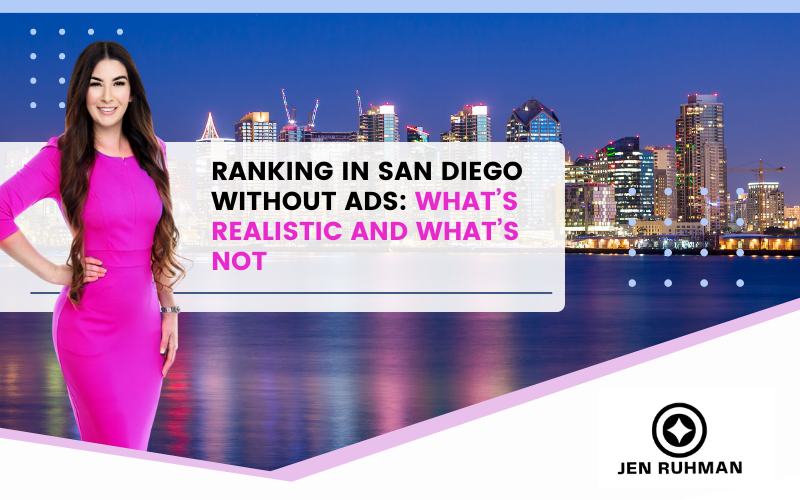
Jan 14, 2026 | SEO Tips

Quick Answers
Can you rank in San Diego without running ads?
Yes — many businesses do — but it requires strategy, patience, and authority-building.
How long does it take?
Most businesses see meaningful organic traction in 6–12 months.
Is it realistic for every business?
No. Some industries and growth stages benefit from ads early on.
Why San Diego Businesses Ask This Question
I hear this all the time as an SEO expert in San Diego:
“Can I just rank without paying for ads?”
And I get it.
Ad Fatigue
Businesses are tired of:
Rising Cost-Per-Click in San Diego
In many San Diego industries, CPCs are brutal:
Legal
Healthcare
Home services
Marketing
The Desire for Something Sustainable
SEO feels more stable — and in many ways, it is.
The Truth About “Free Traffic”
SEO Isn’t Free
Organic traffic doesn’t cost per click, but it costs:
Time vs Money Trade-Off
Ads buy speed.
SEO builds equity.
What Organic Traffic Really Costs
SEO is an investment that compounds — not a shortcut.
What Ranking Without Ads Looks Like in San Diego
Organic Listings
This includes:
Service pages
Blog content
Authority pages
Map Pack Visibility
Google Business Profile visibility is still achievable without ads.
AI Search & SGE Exposure
Well-written, expert content now appears in AI-generated answers — even without ad spend.
What’s Realistic Without Ads
Steady Lead Flow
You won’t see instant spikes — but you’ll see consistency.
Compounding Visibility
Each piece of content supports the next.
Brand Trust Growth
Organic rankings build credibility ads can’t.
What’s NOT Realistic Without Ads
Overnight Rankings
If someone promises this, run.
Beating National Brands Instantly
Large brands take time to outpace organically.
Ranking With Thin Websites
No amount of “SEO tricks” replaces depth.
How Google Decides Who Ranks Organically in San Diego
Authority Thresholds
San Diego has high competition, which means higher standards.
Local Trust Signals
Reviews, mentions, and engagement matter.
Consistency Over Time
Google rewards momentum.
Organic SEO Tactics That Actually Work Without Ads
Topical Authority
Publishing clusters of related content is one of the strongest levers.
This is how businesses rank as an SEO company in San Diego organically.
Neighborhood SEO
Micro-location pages reduce competition and improve conversions.
Internal Linking Strategy
Internal links tell Google what matters most.
Google Business Profile Still Matters
Organic + Map Synergy
Strong organic SEO improves local trust.
Reviews & Engagement
They influence rankings even without ads.
Visibility Without Spend
Your profile can drive calls organically.
The Role of Content in Ranking Without Ads
Helpful vs Promotional Content
Helpful content ranks. Sales pages convert.
You need both.
Experience-Based Writing
Content written by real experts performs better — especially in San Diego.
Supporting Service Pages
Blogs strengthen your money pages.
How Long Ranking Without Ads Takes (Honestly)
First 3 Months
Technical cleanup
Content planning
Early impressions
6–12 Months
Ranking movement
Lead consistency
Brand recognition
Long-Term Payoff
Organic traffic compounds year over year.
Businesses That Succeed Without Ads
Service-Based Local Businesses
Especially those with strong reputations.
Expertise-Driven Brands
If you truly know your field, SEO rewards you.
Patient Owners
SEO favors long-term thinking.
Businesses That Struggle Without Ads
Brand-New Sites
New domains often need time or supplemental ads.
Hyper-Competitive Verticals
Some niches are ad-dominated early on.
Inconsistent Execution
Stopping and starting SEO kills momentum.
Ads vs Organic SEO: The Real Comparison
Control vs Compounding
Ads stop — traffic stops.
SEO builds assets.
Short-Term vs Long-Term ROI
Ads = immediacy
SEO = sustainability
Risk Profile
SEO is slower but more stable.
Final Thoughts & Call to Action
Ranking in San Diego without ads is absolutely possible — but only with realistic expectations.
If you want organic visibility that lasts:
Call or text me: (619) 719-1315
Contact me, San Diego’s favorite SEO.
I’ll help you decide what’s realistic for your business and build a plan that works without wasting money.
Conclusion
SEO can replace ads over time — but it doesn’t replace strategy. In San Diego, businesses that invest in authority, consistency, and patience can absolutely rank without ads and build long-term growth.
FAQs
1. Can I rank without Google Ads at all?
Yes, many businesses do.
2. How long does it take?
Typically 6–12 months for strong results.
3. Is SEO cheaper than ads?
Long-term, yes.
4. Should I run ads and SEO together?
Often, yes — especially early on.
5. Is SEO enough in San Diego?
Yes, with the right strategy.







